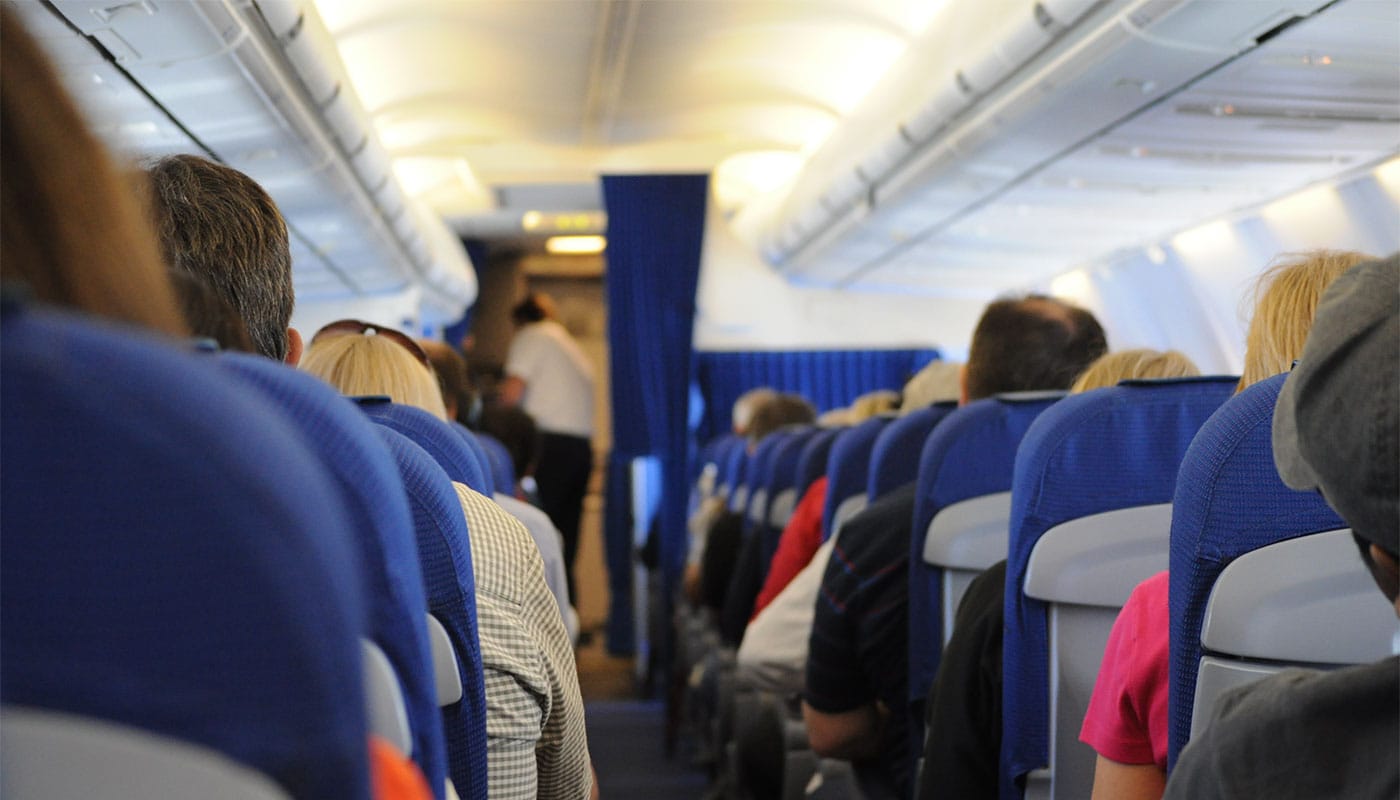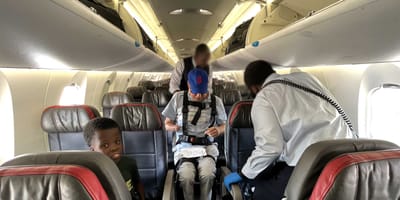In 1986, President Ronald Reagan signed the Air Carrier Access Act into law, with the intent of opening air travel to people with disabilities through greater accessibility and protections for passenger rights. While it was a good start, the law has been dodged in every way possible by airlines, and the Department of Transportation has failed to adequately enforce the civil rights protections contained within.
Earlier this month, Senator Tammy Baldwin (D-WI) introduced S.1318, the Air Carrier Access Amendments Act of 2017. The bill, which would dramatically improve the protections and enforcement mechanisms for air travelers with disabilities, is cosponsored by Senators Richard Blumenthal (D-CT), Tammy Duckworth (D-IL), Maggie Hassan (D-NH) and Ed Markey (D-MA). The Senators were clearly influenced by a recent GAO report, which revealed that more than 30,000 disability-related air travel complaints were filed within the last year.
The Air Carrier Access Amendments Act will Improve Air Travel for People with Disabilities
The Air Carrier Access Amendments Act include a range of new protections designed to make air travel more accessible to people with disabilities. I’ve listed some of the most important below:
- Enforcement: If a complaint received under the Air Carrier Access Act and the Amendments Act suggests that “any person or group of persons has been discriminated against under this section and such discrimination raises an issue of general public importance, the secretary shall refer the matter to the Attorney General.” While this won’t completely bypass the DOT’s enforcement responsibility, it will finally give more power to the Department of Justice. The DOJ would also have the authority to litigate cases of its choosing, “in any appropriate district court of the United States.”
- Private Right of Action: Passengers would finally be able to bring private legal action against air carriers for violations of their rights under the Air Carrier Access Act. The amendment reads, “Any person aggrieved by the violation by an air carrier of this section or a regulation prescribed under this section may, during the 2-year period beginning on the date of the violation, bring a civil action in an appropriate district court of the United States.”
- Access to Bulkhead Seats: As airlines have installed Economy Comfort and Premium Economy seats on aircraft, access to bulkhead seats has been restricted to customers in higher fare classes. The Amendment requires airlines to “provide priority access to bulkhead seating to people with disabilities who need access to the features of those seats due to a disability regardless of class of service of ticket purchased.”
- Civil Penalties & Fines: In the event an airline causes bodily harm to a disabled passenger or damages a wheelchair, the government may impose a fine on the carrier, up to “an amount not to exceed 3 times the maximum penalty otherwise allowed.”
- Airline Passengers With Disabilities Bill of Rights: The Amendments Act would require the Secretary of Transportation to develop a document, “using plain language to describe the basic rights and responsibilities of air carriers, their employees and contractors, and people with disabilities” to ensure easy access to knowledge concerning the air travel experience.
- Personal Wheelchairs In-Cabin: The Amendments Act directs that a study be conducted “to determine the ways in which individuals with significant disabilities who use wheelchairs, including power wheelchairs, can be accommodated on board aircraft through in-cabin wheelchair restraint systems.”
- Advisory Committee on Disability: An advisory committee for the air travel needs of passengers with disabilities would be established, to include two representatives from each of the following groups: individual passengers with disabilities, national disability organizations, airports, air carriers, and contractors who provide assistance to passengers with disabilities.
In addition to these incredible new provisions, the Amendments Act also includes clarification of and emphasis for existing regulations, such as the requirement of timely assistance, including in boarding and deplaning, for all passengers with disabilities. With only a few exceptions, this is really the amendment to the ACAA that I have been calling for and it fulfills needs that I have thoroughly outlined—repeatedly—on this website.
For the full text of the bill, and for updates on its status, click here.
Barriers to Passage
The bill was read twice in the United States Senate and sent to the Committee on Commerce, Science and Transportation. It could easily die there, for a number of reasons.
A provision protecting passengers with emotional support animals will certainly draw the ire of the general public and lawmakers alike. The bill, if it should become law as written, would require the Transportation Secretary to issue new regulations “protecting the ability of travelers to use emotional support animals in air transportation” and “prohibiting air carriers from requesting medical documentation regarding the need for a service animal.”
Due to the widespread abuse of emotional support animal protections, such a provision might be opposed by the public, lawmakers, the airline lobby, persons with pet allergies and, perhaps, some elements of the disability community.
Just as they did with the original Air Carrier Access Act, airlines are likely to stand in strong opposition to additional regulation, falsely claiming that they have adequately met the standards already in place. In this case, it is important to recognize the industry’s contributions to members of Congress and, at this juncture, contributions to senators serving on the Commerce, Science and Transportation committee. The following members of that committee received significant campaign contributions from airlines over the past two years, noted below.
- Sen. Ted Cruz (R-TX) — $166,248
- Sen. John Thune (R-SD, Committee Chair) — $47,490
- Sen. Roy Blunt (R-MO) — $33,450
- Sen. Bill Nelson (D-FL, Ranking Member) — $31,100
- Sen. Amy Klobuchar (D-MN) — $31,050
- Sen. Brian Schatz (D-HI) — $23,735
The figures listed above were sourced from OpenSecrets.org. I have listed only those senators receiving more than $20,000 in contributions from airlines, and who also serve on the committee in question. While I am not accusing any of the senators listed above of improper attention to donors, we must remain cognizant of the fact that money does play a role in American politics.
TAKE ACTION—Support This Bill!
The Air Carrier Access Amendments Act represents our opportunity for disability equality in air travel! We cannot allow the U.S. Senate to consider this bill without our voices being heard! As someone who has taken more than 500 flights as a triple amputee and wheelchair user, the ACA Amendments Act would be the greatest step forward in accessibility in air travel since President Regan signed the ACAA in 1986.
TELL YOUR SENATOR that this bill would change your life and open the world to you! If your senator is a member of the Committee on Commerce, Science and Transportation, YOUR VOICE is especially important!
IF YOU LIVE IN Alaska, Connecticut, Colorado, Florida, Hawaii, Illinois, Indiana, Kansas, Massachusetts, Michigan, Minnesota, Mississippi, Missouri, Nebraska, Nevada, New Hampshire, New Jersey, New Mexico, Oklahoma, South Dakota, Texas, Utah, Washington, West Virginia or Wisconsin, at least one of the committee members is YOUR SENATOR, whether you voted for them or not. Reach out. Speak your mind. Tell them how life-changing this law could be for you and your peers in the disability community. For a full list of committee members, click here.
If you are unsure who your representatives in Congress are or wish to locate their contact information, click here. Remember that e-mails, phone calls and letters ALL work! Make your voice heard! And please be sure to share this article with your friends and family members so they can help our cause, too!
Please do your part to move our community of travelers with disabilities forward into an accessible future!
“I SUPPORT S.1318, THE AIR CARRIER ACCESS AMENDMENTS ACT!”















